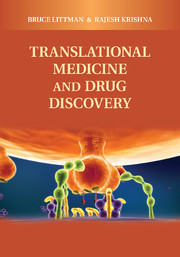Book contents
- Frontmatter
- Contents
- Contributors
- Preface
- Translational Medicine and Drug Discovery
- SECTION I TRANSLATIONAL MEDICINE: HISTORY, PRINCIPLES, AND APPLICATION IN DRUG DEVELOPMENT
- SECTION II BIOMARKERS AND PUBLIC–PRIVATE PARTNERSHIPS
- 8 BIOMARKER VALIDATION AND APPLICATION IN EARLY DRUG DEVELOPMENT: IDEA TO PROOF OF CONCEPT
- 9 IMAGING BIOMARKERS IN DRUG DEVELOPMENT: CASE STUDIES
- 10 EUROPEAN NEW SAFE AND INNOVATIVE MEDICINES INITIATIVES: HISTORY AND PROGRESS (THROUGH DECEMBER 2009)
- 11 CRITICAL PATH INSTITUTE AND THE PREDICTIVE SAFETY TESTING CONSORTIUM
- 12 THE BIOMARKERS CONSORTIUM: FACILITATING THE DEVELOPMENT AND QUALIFICATION OF NOVEL BIOMARKERS THROUGH A PRECOMPETITIVE PUBLIC–PRIVATE PARTNERSHIP
- SECTION III FUTURE DIRECTIONS
- Index
8 - BIOMARKER VALIDATION AND APPLICATION IN EARLY DRUG DEVELOPMENT: IDEA TO PROOF OF CONCEPT
Published online by Cambridge University Press: 04 April 2011
- Frontmatter
- Contents
- Contributors
- Preface
- Translational Medicine and Drug Discovery
- SECTION I TRANSLATIONAL MEDICINE: HISTORY, PRINCIPLES, AND APPLICATION IN DRUG DEVELOPMENT
- SECTION II BIOMARKERS AND PUBLIC–PRIVATE PARTNERSHIPS
- 8 BIOMARKER VALIDATION AND APPLICATION IN EARLY DRUG DEVELOPMENT: IDEA TO PROOF OF CONCEPT
- 9 IMAGING BIOMARKERS IN DRUG DEVELOPMENT: CASE STUDIES
- 10 EUROPEAN NEW SAFE AND INNOVATIVE MEDICINES INITIATIVES: HISTORY AND PROGRESS (THROUGH DECEMBER 2009)
- 11 CRITICAL PATH INSTITUTE AND THE PREDICTIVE SAFETY TESTING CONSORTIUM
- 12 THE BIOMARKERS CONSORTIUM: FACILITATING THE DEVELOPMENT AND QUALIFICATION OF NOVEL BIOMARKERS THROUGH A PRECOMPETITIVE PUBLIC–PRIVATE PARTNERSHIP
- SECTION III FUTURE DIRECTIONS
- Index
Summary
Editors' Note: In 2004, Pfizer leadership sponsored the creation of a confidential “Biomarker Best Practices” document by a cross-discipline and cross-development team of experts that we would today call a “translational research team” or “advisory group.” This work was completed, and Pfizer decided also to produce a public version with the goal of establishing a common view of biomarker definitions, development, validation, and application in drug development. The following chapter was extracted from this public version of Pfizer's “Biomarker Best Practices” document. The editors are grateful for Pfizer's permission to publish it in this book.
The contributors to this document were Michael Bleavins, John Castledine, Joseph C. Fleishaker, Scott Fountain, Frank Hermann, David Lester, Bruce H. Littman, Frank Marcoux, Patrice M. Milos, Damian O'Connell, David Slavin, and Stephen A. Williams.
The Pfizer leadership sponsors of this work were Jim Bristol, Kelvin Cooper, Jeffrey Ives, Diane Jorkasky, Martin Mackay, and Jack Reynolds.
Definitions and Summary of Overarching Principles
Before beginning a discussion of best practices, we establish a consistent language and new ways of classifying biomarkers so that there is less room for confusion: the “biomarker lexicon.” Key definitions and issues include the following:
Definition of a biomarker as “a characteristic that is measured and evaluated as an indicator of normal biologic processes, pathogenic processes, or pharmacological responses to a therapeutic intervention.” [agreement with NIH definition]
New definition of validation as “characterization of the biomarker that demonstrates to the user, its fitness for a specific purpose.”
New description of three types of biomarkers: Target, Mechanism, or Outcome and new qualitative assessment of the linkage of each of the three types of biomarker with a Clinical Outcome measure (high/medium/low) [Editors' note: See definitions in Chapter 1 (Section 1.1) of this book].
[…]
- Type
- Chapter
- Information
- Translational Medicine and Drug Discovery , pp. 195 - 221Publisher: Cambridge University PressPrint publication year: 2011



